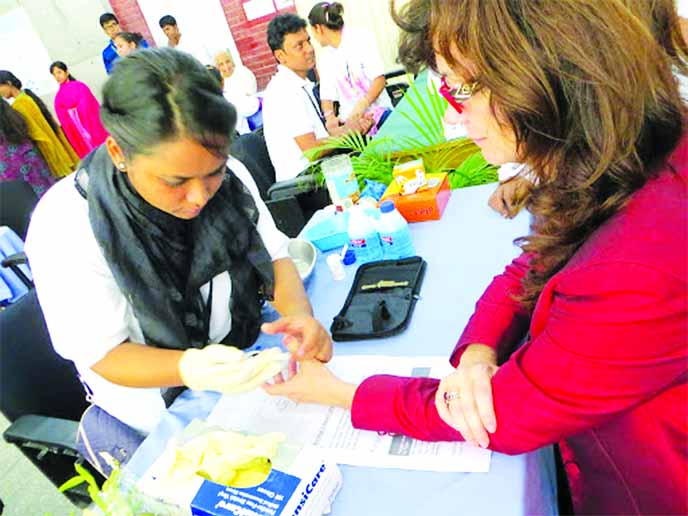
Rukhsana Shaheen :
The world is facing extensive and severe pandemic after the last pandemic about 100 years back. For the last six months, news and views on the pandemic have dominated conversations and media. The current pandemic of Covid-19, as other previous pandemics, is a communicable disease.
During the early days of the Covid-19 pandemic, attention was focused on identifying the infecting agent, understanding the pathological changes occurring in the body, and attempting to find treatment strategies. The agent, a virus, was identified and named SARS-CoV-2, pathological changes occurred in multiple organs in the body, and specific treatment strategies fluctuated leaving supportive management as the only way out.
As total health system of each and every country is focused on Covid-19, attention to the noncommunicable diseases(NCDs) are dimmed. While controlling Covid-19 is of utmost importance, the long-term effect on individuals with NCDs is also significant as certain NCDs appear to increase the severity of Covid-19 and mortality risk thereof.
As the virus affects multiple organs, it can lead to NCDs among survivors by decreasing organ functions. This is compounded by Covid-19 infection containment measures with substantial short- and long-term consequences: social/personal distancing, isolation and quarantine reduce physical activity, and promote other unhealthy lifestyle practices.
Confinement in home may lead to decreased photobiological effects and vitamin D levels might decrease with consequent disturbed calcium metabolism. This may manifest as tetany and rickets among children and young adults. Among senior citizens it may cause osteoporosis or weakening of bones. Home confinement without other activities may lead to mental health disorders in all age groups.
In the shadows of Covid-19, routine management of NCDs has suffered a set-back. Cancelling non-urgent outpatient visits may have dire implications for patients suffering from any form of NCDs, diagnosis of new-onset NCDs may go undetected, compliance with medication may be hampered, and NCDs progression may be uncontrolled.
The current situation provides an opportunity to learn how to leverage healthcare using improved technologies and procedures to optimize services for comprehensive healthcare for all categories of health conditions.Excluding persons in quarantine or isolation, as means of selfcare one should carry out some indoor exercise, may attention to taking nutritious food, continue medications as suggested, and engage in activities that allows mental peace and satisfaction.
For those who cannot exercise in confined places and for healthy growth of children, open spaces, school compounds,playgrounds, parksand walkways may be kept accessible as part of essential services. Exclusive attention to handling the current Covid-19 pandemic may expose the present and future generations to impending NCD pandemic.
It is uncertain how long the Covid-19 pandemic will continue, hence, health professionals and policy makers from all sectors need to put together a comprehensive plan of action for healthy lifestyle practices and NCD management.
The world is facing extensive and severe pandemic after the last pandemic about 100 years back. For the last six months, news and views on the pandemic have dominated conversations and media. The current pandemic of Covid-19, as other previous pandemics, is a communicable disease.
During the early days of the Covid-19 pandemic, attention was focused on identifying the infecting agent, understanding the pathological changes occurring in the body, and attempting to find treatment strategies. The agent, a virus, was identified and named SARS-CoV-2, pathological changes occurred in multiple organs in the body, and specific treatment strategies fluctuated leaving supportive management as the only way out.
As total health system of each and every country is focused on Covid-19, attention to the noncommunicable diseases(NCDs) are dimmed. While controlling Covid-19 is of utmost importance, the long-term effect on individuals with NCDs is also significant as certain NCDs appear to increase the severity of Covid-19 and mortality risk thereof.
As the virus affects multiple organs, it can lead to NCDs among survivors by decreasing organ functions. This is compounded by Covid-19 infection containment measures with substantial short- and long-term consequences: social/personal distancing, isolation and quarantine reduce physical activity, and promote other unhealthy lifestyle practices.
Confinement in home may lead to decreased photobiological effects and vitamin D levels might decrease with consequent disturbed calcium metabolism. This may manifest as tetany and rickets among children and young adults. Among senior citizens it may cause osteoporosis or weakening of bones. Home confinement without other activities may lead to mental health disorders in all age groups.
In the shadows of Covid-19, routine management of NCDs has suffered a set-back. Cancelling non-urgent outpatient visits may have dire implications for patients suffering from any form of NCDs, diagnosis of new-onset NCDs may go undetected, compliance with medication may be hampered, and NCDs progression may be uncontrolled.
The current situation provides an opportunity to learn how to leverage healthcare using improved technologies and procedures to optimize services for comprehensive healthcare for all categories of health conditions.Excluding persons in quarantine or isolation, as means of selfcare one should carry out some indoor exercise, may attention to taking nutritious food, continue medications as suggested, and engage in activities that allows mental peace and satisfaction.
For those who cannot exercise in confined places and for healthy growth of children, open spaces, school compounds,playgrounds, parksand walkways may be kept accessible as part of essential services. Exclusive attention to handling the current Covid-19 pandemic may expose the present and future generations to impending NCD pandemic.
It is uncertain how long the Covid-19 pandemic will continue, hence, health professionals and policy makers from all sectors need to put together a comprehensive plan of action for healthy lifestyle practices and NCD management.
(Rukhsana Shaheen, PhD is a retired Assistant Professor of Community Medicine, and now working as freelance Public Health worker based at workstation in New DOHS, Dhaka, Bangladesh; email: [email protected]).

